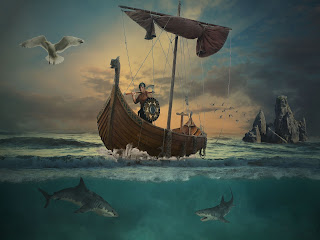Old
English
1500 years ago, in the 5th
century CE, a Germanic tribe, the Angles, traversed the North Sea to invade
Britain. The earliest of these attacks was in 449 CE. Later, the Saxons and
Jutes did the same. These tribes lived in what we now know as northern Germany and Denmark.
The Germanic dialects of the Angles,
Saxons and Jutes were the languages that gave birth to a new language in
Britain, the English language. This language is called Old English or
Anglo-Saxon. The erstwhile home of the Angles was called ‘Englaland’. Their language was known as ‘Englisc’. The
words ‘England’ and ‘English’ were formed from these old words.
These invading tribes fought
with the Celtic inhabitants of the country. Most of them were slaughtered or
enslaved. Some were fortunate to have fled to the safety of Wales, Ireland and
Scotland.
In 2021, a speaker of English
may find it almost impossible to comprehend Old English. Around 50% of the
predominantly used words in contemporary English possess Old English roots. Many
words from this era constitute modern English vocabulary like ‘bread’, ’house’,
‘cow’ and ‘sword’. The earliest inscriptions of Old English that have been
retrieved range from 450 CE to 480 CE.
Many written works of the Old
English period have survived. The text with the greatest literary finesse is
‘Beowulf’. It’s the oldest known poem in English literature. We don’t know who
the author is. It narrates the tale of a valiant king who battled monsters.
Since around 800 CE, the
Vikings started to attack and loot coastal Britain. They belonged to Norway,
Denmark and other north European countries. These people captured human beings
to make them their slaves.
In certain areas of Britain, the
Vikings set up temporary bases, some of which became permanent. Many of the
Vikings made Britain their home. Plenty of English words of our modern daily
vocabulary have been coined from the speech of the Vikings. Words, the
etymology of which may be traced to north European nations include ‘crawl’,
‘lift’, ‘leg’, ‘egg’, ‘skull’, ‘sky’, etc.
Old English was in vogue till around 1100 CE. The Norman
Conquest of England in 1066 CE paved the
transition to Middle English.
#OldEnglish, #MiddleEnglish, #Germanic, #Angles,
#NorthSea, #Britain, #Saxons, #Jutes, #Germany,
#Denmark, #England, #English, #Celtic, #bread, #house, #cow, #sword, #Beowulf,
#poetry, #literature, #Vikings, #Norway, #slavery, #Europe, #crawl, #lift, #leg,
#egg, #skull, #sky
https://pixabay.com/photos/waters-ocean-sea-vikings-island-3060940/: Image courtesy (Image by Lothar Dieterich from Pixabay ). I found this image when I searched for the Vikings on Pixabay.




Comments
Post a Comment